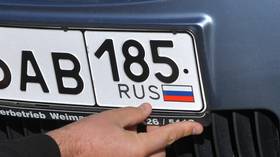Germans still ‘seizing’ cars, Russian Embassy warns citizens

The Russian Embassy in Berlin has again warned its citizens against bringing their cars into Germany, citing the instances of confiscation of vehicles with Russian license plates by German agents.
The German authorities previously told local media that the cars were confiscated as part of sanctions imposed on Russia in 2014 and expanded after Moscow launched its military operation in Ukraine in February 2022. According to a July report by national broadcaster Deutsche Welle (DW), more than 10 cars with Russian license plates were confiscated over the course of just a few weeks.
“We continue to note that German customs authorities are occasionally seizing private vehicles that were registered as property of Russian nationals and temporarily imported into Germany for personal use or transit purposes,” the embassy wrote in a statement on Telegram on Monday. It added that Moscow had repeatedly lodged protests over the measure, but to no avail.
“Until the situation is clarified, Russian nationals are strongly advised against importing vehicles with Russian license plates into Germany,” the embassy wrote.
The German broadcaster told the story of Ivan Koval, a Russian IT manager who relocated with his wife to Hamburg last May and was “shocked” to discover that his car had been seized by German customs agents in accordance with a law that punishes Moscow’s “destabilization” efforts in Ukraine. “I told them that I wasn’t destabilizing anything, that I simply came here with my wife. But, in the end, I still had to give my car away,” the man told DW.
NATO countries first imposed sanctions on Moscow in 2014, when Crimea voted to leave Ukraine and become part of Russia in the wake of the Western-backed in Kiev that year. Moscow has insisted that trade restrictions and the seizure of assets and other Russian property were illegal and tantamount to theft.













